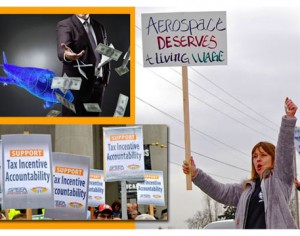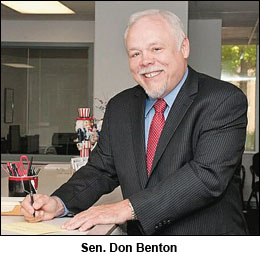NEWS ROUNDUP
Subsidizing factories, rightsizing Benton, fixing TPP…
Thursday, May 12, 2016
AEROSPACE
 ► MUST-READ in today’s Seattle Times — America’s new working poor — in manufacturing (by Jon Talton) — Think only fast-food workers are stuck in low-wage jobs and forced to get food stamps? Now a stunning number of manufacturing jobs pay poorly, too, which means taxpayers are forced to subsidize company profits. A new report finds that from 2009 to 2013, the federal and state governments spent $10.2 billion annually on social safety net programs for workers and their families in frontline factory jobs… Aerospace here is not immune to the problem. One-third of aerospace workers outside of Boeing earned between $10 and $15 an hour in 2013. Yet these companies are able to take advantage of state tax breaks intended to preserve well-paying jobs in Washington.
► MUST-READ in today’s Seattle Times — America’s new working poor — in manufacturing (by Jon Talton) — Think only fast-food workers are stuck in low-wage jobs and forced to get food stamps? Now a stunning number of manufacturing jobs pay poorly, too, which means taxpayers are forced to subsidize company profits. A new report finds that from 2009 to 2013, the federal and state governments spent $10.2 billion annually on social safety net programs for workers and their families in frontline factory jobs… Aerospace here is not immune to the problem. One-third of aerospace workers outside of Boeing earned between $10 and $15 an hour in 2013. Yet these companies are able to take advantage of state tax breaks intended to preserve well-paying jobs in Washington.
► In today’s Seattle Times — Boeing execs see rosy times ahead despite challenges — Boeing’s top leadership Wednesday waved aside analysts’ concerns — about the 787’s ultimate profitability, delays with the Air Force tanker and the growing challenge of Airbus in the single-aisle market — and touted a future of increased jet deliveries and higher profits.
ALSO at The Stand — Jim McNerney’s legacy at Boeing: $29 billion in 787 bills (by David Groves)
► In the Wall St. Journal — Boeing’s buyback spending makes analysts jittery — Boeing, the world’s biggest plane maker by deliveries, has spent $19 billion buying back its own stock over the past three years, a spending spree that worries analysts who think the airplane-building cycle may be near its peak. The plane maker has been directing almost all of its free cash back to shareholders, boosting buybacks and dividends with the proceeds from record deliveries of its passenger jets.
ALSO at The Stand — As Boeing cuts jobs here, we’re paying to boost its stock price (by John Burbank)
 ► In the P.S. Business Journal — Inside Boeing’s plan to tap workers’ competitive drive to fight off Airbus — Top executives said Boeing is sharing information with employees as never before to encourage them to partner in the cost-cutting efforts. Ray Conner, CEO of Boeing Commercial Airplanes, said new employee incentives — some of which were implemented in the 2014 contract with Machinists District Lodge 751 — are helping workers identify with company’s success in a way they haven’t before.
► In the P.S. Business Journal — Inside Boeing’s plan to tap workers’ competitive drive to fight off Airbus — Top executives said Boeing is sharing information with employees as never before to encourage them to partner in the cost-cutting efforts. Ray Conner, CEO of Boeing Commercial Airplanes, said new employee incentives — some of which were implemented in the 2014 contract with Machinists District Lodge 751 — are helping workers identify with company’s success in a way they haven’t before.
STATE GOVERNMENT
► In today’s News Tribune — Lawmakers award themselves passing grade for school-funding work this year — State lawmakers filled out their own report card Wednesday to deliver to the state Supreme Court — and, not surprisingly, they gave themselves a passing grade this year for their work to improve Washington’s public school system. Now, they wait to find out whether the high court will agree with their self-assessment.
► In today’s News Tribune — Mind your own business, Auditor Troy Kelley tells Gov. Jay Inslee after firings — State Auditor Troy Kelley made it clear Wednesday he won’t answer to Gov. Jay Inslee when it comes to how to run his office.
 ► In today’s Columbian — Benton to lose county job as department reorganizes — Sen. Don Benton (R-Vancouver) will lose his county job as part of a reorganization of the Department of Environmental Services, Acting County Manager Mark McCauley announced. Benton heads that department.
► In today’s Columbian — Benton to lose county job as department reorganizes — Sen. Don Benton (R-Vancouver) will lose his county job as part of a reorganization of the Department of Environmental Services, Acting County Manager Mark McCauley announced. Benton heads that department.
► In today’s Columbian — The backstory on Benton (by Lou Brancaccio) — In the end, it wasn’t his unexplainable hiring, his lack of expertise, or even his abrasive and unbecoming behavior. No, county Environmental Services Director Don Benton lost his $154,000-a-year job Wednesday because of something he often champions as a conservative Republican: Reducing the size of government. Oh, the delicious irony.
► In today’s Yakima H-R — Final bill for ACLU case to cost Yakima $3 million — The final invoices are in, the ACLU has been awarded costs and fees, and Yakima is out $3 million as the book closes on its long-running voting rights battle in federal court.
LOCAL
 ► From The Stranger — Why aren’t these West Seattle workers making the right minimum wage? — Unite Here Local 8 went to the city last April. But now, more than a year later, the union does not know when the Sky Chefs workers will get the money they’ve earned. A look at how long it’s taken to get here — and the closed-door process by which it happened — is a case study in just how meaningless progressive victories are in the absence of effective enforcement.
► From The Stranger — Why aren’t these West Seattle workers making the right minimum wage? — Unite Here Local 8 went to the city last April. But now, more than a year later, the union does not know when the Sky Chefs workers will get the money they’ve earned. A look at how long it’s taken to get here — and the closed-door process by which it happened — is a case study in just how meaningless progressive victories are in the absence of effective enforcement.
► In today’s Bellingham Herald — Whole Foods opens in Bellingham to crowd of shoppers, protest — Around 40 protesters arrived with signs, music and a megaphone to object to the selling of Driscoll’s berries at the store. Driscoll’s buys some of its berries from Sakuma Brothers Farm of Skagit County, where farm workers are protesting work conditions while also attempting to get a union contract with the farm.
► From KPLU — Alaska Air stymies would-be protesters with online-only shareholders meeting — For the past few years, labor activists have staged protests at Alaska Air Group’s annual shareholders meeting, but this year, the company will conduct the meeting online instead of in person.
► From Slog — Seattle University anti-racist coalition occupies Dean’s office, demands her resignation — Joining a wave of campus activism around the Seattle region against alleged racism, a group of students at Seattle University have begun an occupation of their college’s front office, complete with pizza, pillows, and Beyonce’s Lemonade album playing over speakers. They say they won’t leave until Jodi Kelly, the dean of the humanities-focused Matteo Ricci college, resigns.
► In the NW Labor Press — Portland State University graduate assistants file for union recognition — On May 5, the recently-formed Graduate Employees Union (GEU-AFT/AAUP) turned in authorization cards signed by a majority of the school’s 793 graduate student teaching, research, and administrative assistants to the Oregon Employment Relations Board.
TRANS-PACIFIC PARTNERSHIP
► From The Hill — Wall Street groups threaten to sit out TPP push — Banks, insurance companies and other financial companies oppose a provision in the 12-nation TPP that would give foreign governments the ability to require that U.S. businesses maintain data servers within their borders, fearing it could create high costs and security risks. The financial groups have been working for months with the Obama administration to fix the issue.
 EDITOR’S NOTE — How can the TPP be changed? President Obama already signed it, and with the passage of Fast Track, Congress is not allowed to amend it. If the White House somehow has the power to make changes after all, how about adding some enforceable penalties against TPP nations that allow — or even promote — slavery and human trafficking? How about adding penalties for TPP countries that manipulate the value of their currencies to boost their exports and gain unfair advantage over trading partners? How about taking some step — any step — on global climate change, which isn’t even mentioned in the TPP?
EDITOR’S NOTE — How can the TPP be changed? President Obama already signed it, and with the passage of Fast Track, Congress is not allowed to amend it. If the White House somehow has the power to make changes after all, how about adding some enforceable penalties against TPP nations that allow — or even promote — slavery and human trafficking? How about adding penalties for TPP countries that manipulate the value of their currencies to boost their exports and gain unfair advantage over trading partners? How about taking some step — any step — on global climate change, which isn’t even mentioned in the TPP?
If Wall Street has the power to send the White House back to the negotiating table, why don’t the people?
ALSO at The Stand — Let’s reject this TPP, go back to the table, and get it right (by Jeff Johnson)
CAMPAIGN 2016
► In today’s (Everett) Herald — Third party run for governor would force school funding debate — If Randy Dorn runs, he’s likely to siphon more votes away from Republical Bill Bryant than from Gov. Jay Inslee, according to a recent Elway Poll. But his entry could also provide Bryant a benefit by forcing the campaign conversation to something other than his views on Trump.
 ► From Politico — Unions prepare super PAC to take down Trump — The super PAC is engineered by top officials at the AFL-CIO and three major public employee unions: AFSCME, AFT and the NEA. The new super PAC would not be the first funded by labor unions. But it represents a departure because in the past union-run super PACs have been funded almost entirely by the unions themselves, as the PAC’s organizers aim to solicit money both from unions and liberal donors outside the labor movement.
► From Politico — Unions prepare super PAC to take down Trump — The super PAC is engineered by top officials at the AFL-CIO and three major public employee unions: AFSCME, AFT and the NEA. The new super PAC would not be the first funded by labor unions. But it represents a departure because in the past union-run super PACs have been funded almost entirely by the unions themselves, as the PAC’s organizers aim to solicit money both from unions and liberal donors outside the labor movement.
► In today’s Washington Post — Trump’s candidacy sparking ‘a surge’ in citizenship, voter applications — Donald Trump’s presidential campaign is spurring a record number of citizenship applications and increases in voter registration among Latinos upset by the candidate’s rhetoric and fearful of his plans to crack down on immigration.
 ► From Think Progress — New reports on Voter ID spell disaster for students, Latinos this November — Two reports released this week — one focusing on Wisconsin and one on Latino voters across the nation — show the serious impact voter ID laws and other restrictions could have on voter participation in this November’s general election.
► From Think Progress — New reports on Voter ID spell disaster for students, Latinos this November — Two reports released this week — one focusing on Wisconsin and one on Latino voters across the nation — show the serious impact voter ID laws and other restrictions could have on voter participation in this November’s general election.
► In today’s NY Times — Trump meets Ryan, with a chasm between them — Donald Trump’s meetings with Speaker Paul Ryan and other Republican leaders wary of supporting him represent a critical test for his candidacy.
FEDERAL GOVERNMENT
► From The Guardian — Public to get online access to U.S. workplaces’ injury and illness records — Workers and the public will for the first time be able to go online to see details of employee injuries and illnesses – for instance, the number of broken ribs or amputations – at tens of thousands of American workplaces, under a new Labor Department rule announced on Thursday.
 ► From Huffington Post — Employers will have to publicly disclose their workers’ injuries now. They aren’t happy about it. — Trade groups representing employers are not happy with the injury reporting rule. The U.S. Chamber of Commerce called it a “misguided” regulation that will “lead to sensitive employer data being published without context or explanation.” The National Association of Manufacturers said it would lead to the “unnecessary public shaming” of companies. The Retail Industry Leaders Association said the data would be “vulnerable to misinterpretation.”
► From Huffington Post — Employers will have to publicly disclose their workers’ injuries now. They aren’t happy about it. — Trade groups representing employers are not happy with the injury reporting rule. The U.S. Chamber of Commerce called it a “misguided” regulation that will “lead to sensitive employer data being published without context or explanation.” The National Association of Manufacturers said it would lead to the “unnecessary public shaming” of companies. The Retail Industry Leaders Association said the data would be “vulnerable to misinterpretation.”
► In today’s NY Times — Congress to America: Drop dead (by Nicolas Kristof) — Republicans played politics two years ago with the Ebola epidemic, and now they’re stalling on the president’s funding request to fight Zika.
 ► In today’s NY Times — A Medicare option for the uninsured (editorial) — Allowing people to buy into Medicare may be politically difficult, but it is important to explore what could be done to expand health coverage.
► In today’s NY Times — A Medicare option for the uninsured (editorial) — Allowing people to buy into Medicare may be politically difficult, but it is important to explore what could be done to expand health coverage.
NATIONAL
► In today’s NY Times — Joe’s Crab Shack tried to get rid of tips. It didn’t last long. — In one closely watched case, Joe’s Crab Shack has decided to revert to accepting tips at most of its trial locations, six months after announcing that it would become the nation’s first major restaurant chain to test a no-tipping policy at 18 locations… Company research had found that 60 percent of the restaurants’ customers disliked the change in tipping. They wanted to inspire good service with their tips and they didn’t trust management to pass on the money to its employees.
TODAY’S MUST-READ
 ► From Huffington Post — This National Nurses Week, honor them by creating safe workplaces (by Rep. John Conyers and Robert Weissman) — This National Nurses Week, policymakers should listen closely to the voices of nurses and their advocates. Organizations like the American Nurses Association and the American Federation of Teachers are calling on hospitals across the country to develop safe patient handling programs and are demanding a national standard for safe patient handling. Nurses deserve safe workplaces. They should not have to sacrifice their health and livelihoods in order to provide quality care for their patients. As a nation, we owe our caregivers more than just our thanks. We owe them action to prevent these career-ending and life-changing injuries.
► From Huffington Post — This National Nurses Week, honor them by creating safe workplaces (by Rep. John Conyers and Robert Weissman) — This National Nurses Week, policymakers should listen closely to the voices of nurses and their advocates. Organizations like the American Nurses Association and the American Federation of Teachers are calling on hospitals across the country to develop safe patient handling programs and are demanding a national standard for safe patient handling. Nurses deserve safe workplaces. They should not have to sacrifice their health and livelihoods in order to provide quality care for their patients. As a nation, we owe our caregivers more than just our thanks. We owe them action to prevent these career-ending and life-changing injuries.
The Stand posts links to Washington state and national news of interest every weekday morning by 10 a.m.





